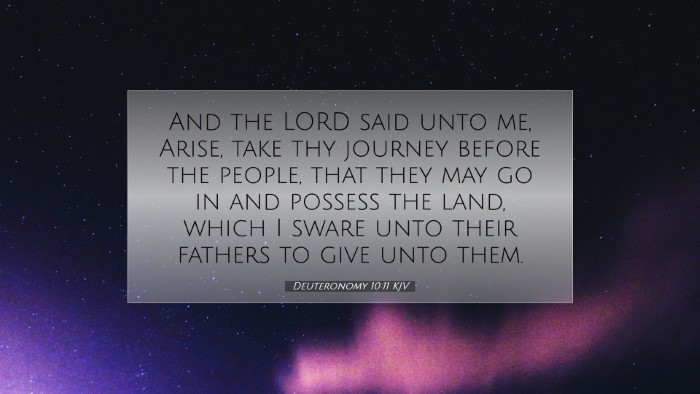Commentary on Deuteronomy 10:11
Deuteronomy 10:11 states:
"And the LORD said unto me, Arise, take thy journey before the people, that they may go in and possess the land, which I sware unto their fathers to give unto them."
Overview
This verse serves as a pivotal moment in the narrative of Deuteronomy, emphasizing God's command to Moses to lead the Israelites toward the Promise Land. As we explore insights from various public domain commentaries, we will uncover the theological implications, historical context, and practical applications of this significant command.
Insights from Matthew Henry
Divine Mandate
Matthew Henry emphasizes the authority of God in issuing commands. Here, God is not merely suggesting a course of action but is directing Moses to arise and lead the people. This divine mandate reflects God's sovereignty and His commitment to fulfill His promises made to Abraham, Isaac, and Jacob.
Encouragement for Leadership
Henry also highlights the importance of leadership in the faith journey. Moses, positioned as a leader, is called to act despite the challenges ahead. This call can be seen as a reminder to present-day leaders that obedience to God's command is paramount, even when the path is fraught with difficulties.
Possessing the Land
The term "possess" indicates more than just physical occupation; it points to the spiritual inheritance that belongs to the people of Israel. Henry elucidates the idea that God's promises require active participation from His people—an essential principle for church leaders and congregants alike.
Insights from Albert Barnes
Covenantal Context
Albert Barnes explores the covenantal aspect of God's command. God's promise to give the land was rooted in loyalty to His covenant with Israel. Barnes notes that the land promised was a symbol of both physical and spiritual blessing—indicating a profound relationship between obedience to God and the receipt of His blessings.
Preparation for Action
Barnes points out the phrase "arise, take thy journey" as a call to action. It signifies not only the need for physical movement but also spiritual readiness. Leading the people into the land signifies preparation to engage in the work that God has set before them, which is crucial for anyone engaged in ministry.
Acting on God’s Promises
Furthermore, Barnes reflects on the necessity of faith in acting upon God’s promises. To possess the Promised Land, the Israelites needed to demonstrate faith through action—a concept echoed throughout the New Testament that resonates with believers today.
Insights from Adam Clarke
Historical Context
Adam Clarke provides a historical background, noting that this command comes after a period of repentance and renewal. God reassures Moses and the Israelites of their purpose, emphasizing that their journey is not merely migration but a significant covenantal transition with deep-rooted significance.
Israel’s Identity
Clarke draws attention to the identity of Israel as a chosen people. This command reiterates their identity and responsibility as recipients of God's covenant. Understanding one's identity in God's plan is critical for contemporary believers, encouraging a clear vision of purpose and belonging.
Encouragement for Spiritual Journey
Clarke encourages readers to view this verse as an exhortation to embark on their spiritual journeys with determination and faith. The journey towards 'possessing the land' symbolizes broader spiritual victories that believers are called to strive for in their personal and communal faith lives.
Theological Reflections
In light of these insights, various theological themes emerge:
- Sovereignty of God: The divine command highlights God's sovereignty and His faithful nature in fulfilling His promises.
- Faith and Action: Believers are called not only to trust in God's promises but to act upon them with faith.
- Spiritual Inheritance: The promise of land represents spiritual blessings that transcend physical territory—calling believers to seek God’s kingdom actively.
- Leadership and Obedience: Effective leadership requires obedience to God’s directive and serves as a model for congregational life.
- Covenant Relationship: The assertion of a covenant relationship underlines the commitment expected from both God and His people, shaping our understanding of Christian discipleship.
Practical Applications
As pastors, students, theologians, and Bible scholars delve into this verse, several practical applications are pertinent:
- Emphasis on Action: Encourage congregational engagement through ministries that seek to "possess" the spiritual inheritance of the church.
- Remind of Identity: Help believers recognize their identity as part of God’s covenant people, fostering a sense of belonging and purpose.
- Promote Leadership Development: Equip church leaders to respond to God’s commands with courage, emphasizing the importance of obedience in their ministries.
- Highlight the Journey of Faith: Teach on the importance of the pilgrimage of faith, likening it to Israel’s journey and the need for spiritual readiness.
Conclusion
Deuteronomy 10:11 invites reflection and response, reminding believers of the imperative to act upon God’s promises. Through insights derived from esteemed commentators, we are called to embrace our roles in fulfilling God's purposes, driven by our identity as covenant partners in His divine plan.


